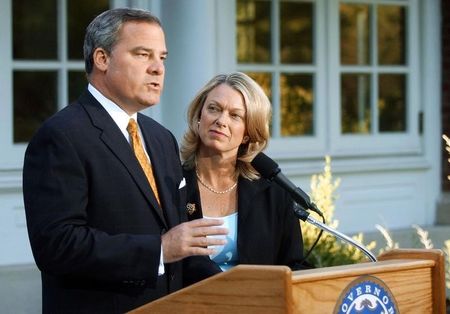By Richard Weizel
NEW HAVEN Conn. (Reuters) - Former Connecticut Governor John Rowland carried out a scheme to use a phony nursing home contract to hide his work as a paid adviser for a 2012 congressional candidate in violation of federal campaign law, prosecutors said on Thursday.
Closing remarks by Assistant U.S. Attorney Christopher Mattei, following remarks by defense attorney Reid Weingarten, came after two weeks of testimony at U.S. District Court in New Haven.
Afterwards jurors began deliberations over the charges against the Republican ex-governor, who pleaded guilty to political corruption a decade ago and served prison time. The most serious are two counts of falsifying records in a federal investigation, punishable by up to 20 years in prison.
In his statement, Mattei reminded jurors of the language Rowland had used in emails to officials of Lisa Wilson-Foley's 2012 campaign for Congress.
The emails, presented as evidence, spoke of providing "cover" for the contract and "I get it" when Rowland responded to a staffer's concerns about keeping his role in the campaign hidden.
"What are we to take as the meaning of these terms if this wasn't a fake contract with no need for it to be covered up?" Mattei asked.
In his closing remarks, Weingarten noted that Brian Bedard, an executive at Apple Health Care, had testified that Rowland performed legitimate work for the nursing home operator, which was owned by Wilson-Foley's husband.
"If this were all a sham, why would he have been doing this work for the nursing home?" Weingarten said.
Weingarten defended the former governor's "volunteer work" on the campaign as a "labor of love."
During the trial, Brian Foley, the candidate's husband, testified against Rowland, saying he was paid by his business as part of a "sham" for working as a political consultant on his wife's unsuccessful campaign.
Foley and Wilson-Foley had sought to conceal the help they received from Rowland, who served 10 months in prison, because of the negative publicity it might bring, prosecutors contend.
Foley and his wife pleaded guilty to conspiracy to make illegal campaign contribution in March, and Foley then agreed to testify for the prosecution.
Mattei also reminded jurors that Rowland sought a $10,000 bonus from Foley if his wife won the nomination at the Republican Party's convention.

"Does that sound like something a volunteer for a campaign would seek?" Mattei asked jurors.
(Editing by Eric Walsh)
